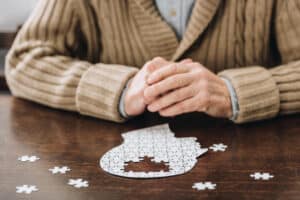
In some cases, patients who have an incomplete form of locked-in syndrome may regain the ability to live functionally. Studies of patients with locked-in syndrome show that those with the classic form of the condition may regain some limited motor function, but he or she rarely reach any functional independence.
Those with the incomplete form of the condition may fare better and recover more motor function, depending on the individual facts of their case. This could allow them to get around using a walker or even return to work.
What Is the Incomplete Form of Locked-In Syndrome?
In locked-in syndrome, the patient has quadriplegia and retains only small motor function, usually vertical eye movement. The person is, however, conscious and aware of those around them. He or she generally remain cognitively intact.
There are three different forms of locked-in syndrome:
- Classic: The patient retains vertical eye movement and may be able to blink
- Incomplete: The patient retains vertical eye movement as well as other voluntary motor function
- Total: The patient is conscious and aware but retains no voluntary movement
While all patients with locked-in syndrome can recover some motor function, it is generally not enough to allow them to live independently or return to their previous jobs. The amount of recovery possible depends on the injury to the brain, how quickly he or she received treatment and many other factors.
Those with incomplete injuries who retained significant motor function may be better able to regain functional independence than those who suffer from more severe forms of the disease.
Treatment and Rehabilitation Can Make a Difference for Those with Incomplete Locked-In Syndrome
There is no gold standard treatment or cure for locked-in syndrome. Most hospitals utilize the same protocol they would for any other stroke and provide the support necessary to keep the patient alive in the first hours and days following admission. This often requires a stay in the critical care unit, as well as a tracheostomy and respiratory support.
Once the patient is through the acute care period and regains consciousness, the treatment focuses on providing the rehabilitation and support that best meets their individual needs. No two cases of incomplete locked-in syndrome are alike. Therapies are often intensive and may include:
- Speech and language therapy
- Physical therapy
- Occupational therapy
- Respiratory therapy
- Help to learn communication devices
- Learning to swallow or following a new diet
During recovery and if the patient remains bed-bound, it is imperative to reduce the risk of opportunistic infections and other complications. This may include:
- Pressure sores
- Pneumonia
- Aspiration pneumonia
- Urinary tract infection
- Pulmonary embolism
- Corneal abrasions
Some People Have Made Remarkable Recoveries Despite Locked-In Syndrome
When someone diagnosed with locked-in syndrome makes a significant recovery, it often makes the news. This is because it is still rare. Most people diagnosed with locked-in syndrome, even the incomplete form, remain unable to care for themselves or live functionally.
Some learn to type with a single finger or move their wrist enough to control a power wheelchair. Most learn to communicate using an eye gaze device or other technology. Many report a relatively high quality of life.
Still, there are those who overcome the odds. The abilities to breathe, swallow, and sometimes even talk are regained. Some have learned to walk again. Several have returned to work or found a new line of work.
Talk to a Brain Injury Lawyer If Your Loved One Suffers from Locked-In Syndrome
If you have a family member diagnosed with incomplete, classic, or total locked-in syndrome, the attorneys from Newsome | Melton want to talk to you about their case. We will review the facts of their case and may be able to identify the role someone else’s negligence played in causing or exacerbating their injury.
When we can identify a negligent party, who is liable for your loved one’s injury, we can pursue a payout on behalf of your family member. This could allow them to recover compensation to pay for their hospitalization, ongoing care, or even high-tech communications devices.
Call us today at (800) 917-5888. A member of our team is standing by to review your case. We take on complex civil litigation and fight to protect the rights of our clients.
